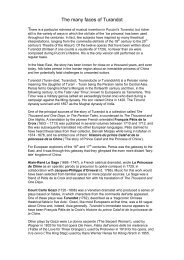NEF-Southampton-Positive-Money-ICB-Submission
NEF-Southampton-Positive-Money-ICB-Submission
NEF-Southampton-Positive-Money-ICB-Submission
Create successful ePaper yourself
Turn your PDF publications into a flip-book with our unique Google optimized e-Paper software.
of 8.2% p.a. (a total increase over that Gme of 370%). 16 In this Gme, the Retail Price Index has increased by<br />
88.5% 17 (an annual average of 3.15%) while total house price inflaGon in that Gme has been 180%. 18 From<br />
this it appears that removing the ability of bank lending to swell the money supply could go a long way to<br />
reducing inflaGonary pressures in the economy.<br />
Despite this logical analysis, knee-‐jerk reacGons may conGnue. MarGn Wolf points out the inconsistent<br />
though with regards to state-‐issued currency when he states:<br />
"The essence of the contemporary monetary system is creaGon of money, out of nothing, by private<br />
banks’ open foolish lending. Why is such privaGsaGon of a public funcGon right and proper, but acGon by<br />
the central bank, to meet pressing public need, a road to catastrophe?" 19<br />
Further to the historical evidence, the incenGves of banks should be considered. A Monetary Policy<br />
CommiOee with the responsibility for creaGng the right quanGty of new money to meet a parGcular inflaGon<br />
target will stop creaGng addiGonal money as soon as the inflaGon rate rises above the target rate. In contrast,<br />
banks will conGnue creaGng money as long as they can profitably make loans, since every loan they issue<br />
creates brand new bank deposits and income for the bank. It should be obvious that in every situaGon other<br />
than a banking crisis, banks are likely to increase the money supply, creaGng a permanent upward pressure<br />
on inflaGon.<br />
In conclusion, inflaGon appears to be significantly less likely in a full-‐reserve banking system in which the<br />
Monetary Policy CommiOee has responsibility for increasing and decreasing the money supply in line with<br />
the needs of the economy. The greatest likelihood of inflaGon comes when commercial banks are able to<br />
increase the money supply through their lending decisions.<br />
4. ‘Full-‐reserve banking would end the process of maturity transformaPon’<br />
A common misunderstanding is that full-‐reserve banking would end maturity transformaGon -‐ the process by<br />
which short-‐term investments are ‘transformed’ into long-‐term loans, such as mortgages. But it is important<br />
to recognise that under full-‐reserve banking, there is no direct match between a saver and a lender: full-‐<br />
reserve banking is not peer-‐to-‐peer lending.<br />
Under our proposal for full-‐reserve banking, as customers open Investment Accounts, the money is<br />
transferred to the bank’s Investment Pool. When the Investment Pool is sufficiently ‘full’, the bank is able to<br />
make a loan to a borrower. At all Gmes, there are mulGple cashflows in and out of the Investment Pool:<br />
Cashflows into the Investment Pool:<br />
1. The monthly repayments (principal + interest) from mulGple borrowers<br />
2. New investment funds from customers of the bank<br />
3. New investment funds made from the bank’s own capital (which would come from the bank’s<br />
16 M4 figures from Bank of England<br />
17 Office of NaAonal StaAsAcs RPI Index -‐ available from:<br />
h:p://www.staAsAcs.gov.uk/STATBASE/tsdataset.asp?vlnk=229&More=Y<br />
18 NaAonwide House Price Index<br />
19 Financial Times, November 9th 2010. Available from:<br />
h:p://www.i.com/cms/s/0/93c4e11e-‐ec39-‐11df-‐9e11-‐00144feab49a.html#axzz14sno2FXa<br />
27



